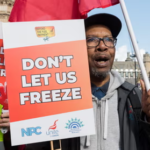Introduction
The proposed free trade agreement (FTA) between India and the UK has stirred controversy, particularly among UK opposition parties and trade unions. Critics argue the deal, while aimed at boosting exports and international cooperation, could negatively impact British workers by undercutting wages and job standards. As negotiations progress, concerns grow about what the agreement might sacrifice in the name of economic diplomacy.



1. Threat to UK Job Protections
One of the main concerns raised by opposition leaders and union officials is the potential erosion of UK job protections. The influx of lower-cost goods and services from India could pressure UK firms to cut costs—often by reducing labor standards or outsourcing roles. Labour has warned that without strong labor clauses, the deal risks becoming a “race to the bottom.”
2. Impact on Manufacturing and Agriculture
UK manufacturing and agriculture sectors are particularly vulnerable. Indian exports could displace domestically produced goods, especially in textiles, machinery, and food products. British farmers and small manufacturers fear they won’t be able to compete on price, jeopardizing livelihoods in rural and industrial regions.
3. Lack of Transparency in Negotiations
Critics argue the FTA negotiations lack transparency, with limited public or parliamentary scrutiny. Opposition MPs have called for more openness, warning that behind-closed-doors agreements could lead to unfavorable compromises, especially on immigration, labor mobility, and regulatory standards.
4. Worker Mobility Clauses Could Undermine Wages
A key element of the deal reportedly includes increased mobility for Indian workers in the UK service sector. While this could benefit some industries, unions worry it may suppress wages in IT, healthcare, and engineering, especially if employment terms aren’t tightly regulated or aligned with UK standards.
5. Trade Priorities Over Worker Welfare
With Prime Minister Rishi Sunak under pressure to strike post-Brexit trade deals, critics say economic targets are being prioritized over domestic welfare. Labour and other parties argue that trade agreements must include enforceable clauses protecting workers’ rights, environmental standards, and public services.
Conclusion
As the India-UK trade deal moves closer to finalization, calls for caution grow louder. Opposition parties and trade unions are demanding safeguards to protect UK workers from potential negative fallout. For the FTA to be truly successful, it must balance economic growth with social responsibility. Policymakers must ensure that in boosting international ties, they do not erode the foundation of domestic labor rights.
Explore more: How Post-Brexit Trade Deals Are Reshaping the UK Economy








